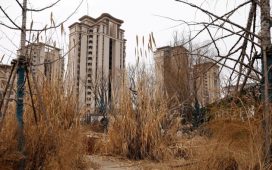Stay informed with free updates
Simply sign up to the Chinese economy myFT Digest — delivered directly to your inbox.
China’s retail spending jumped last month but the property sector remained under pressure despite a barrage of stimulus efforts as policymakers battled to restore confidence in the world’s second-largest economy.
Retail sales rose 4.8 per cent year on year in October, according to official data released on Friday by China’s National Bureau of Statistics, the highest rise in eight months. Industrial production added 5.3 per cent, trailing forecasts of 5.6 per cent, according to a Reuters poll of analysts.
New home prices across 70 major cities dropped 0.5 per cent compared with September, according to Financial Times calculations based on NBS data, the 16th straight month of declines.
Year on year, new home prices dropped 5.9 per cent, the most since 2015, while declining investment in real estate deepened to 10.3 per cent in the 10 months to the end of October, from 10.1 per cent last month.
Beijing has announced a series of support measures since September to boost the economy, such as cutting lending rates and encouraging stock buybacks. Last week, authorities unveiled a debt refinancing package for local governments, which have been hit hard by the three-year property sector slowdown.
The persistent real estate weakness will add to pressure on policymakers as they prepare for a second Donald Trump presidency in the US, which threatens to disrupt trade between the world’s two biggest economies. Exports, which leapt by the most in two years in October, have been one of the few bright spots for the Chinese economy at a time when momentum has waned.
“The real estate sector was particularly disappointing” said Carlos Casanova, senior economist for Asia at UBP, who pointed to “limited spillovers” from the government’s support efforts. “It’s going to take more policy support to get us there,” he added.

Beijing has set a target for GDP growth of about 5 per cent for 2024, one of its lowest in decades. The housing slowdown has added to deflationary pressures and weighed heavily on consumer confidence.
Zichun Huang, China economist at Capital Economics, noted that much of the improvement last month came from consumption, with a gauge of value-added in the services sector, rising 6.3 per cent, the most this year. “Property support measures do seem to be providing some relief to the housing market,” she added, pointing to higher volumes of new home sales.
She predicted accelerated fiscal spending to support activity, but added that Trump’s electoral victory last week “casts a shadow over the outlook further ahead”.
Casanova said that “pockets of strength” in consumption, which he linked to government policies that encouraged consumers to trade in old goods such as household appliances for newer ones, were “not necessarily stable drivers of demand”. Spending was also buoyed by a weeklong holiday in October.
“We don’t believe it’s possible to boost consumption . . . in the absence of some stabilisation of real estate indicators,” he said.









